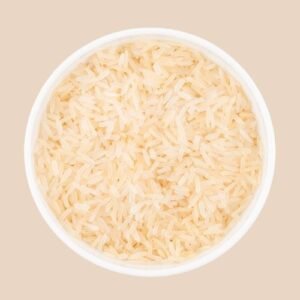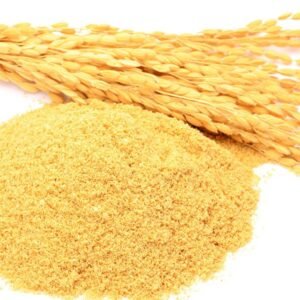Non-Basmati Rice
Non-Basmati Rice
Product Name: Non-Basmati Rice
Scientific Name: Oryza sativa
Family: Poaceae
Processing: Husking, milling, polishing
Moisture: 14% Max
Purity: 98% Min
Admixture: 2% Max
Broken Grains: 5% Max
Length: Varies (short, medium, long)
Non-Basmati rice, scientifically known as Oryza sativa and belonging to the Poaceae family, undergoes husking, milling, and polishing processes to ensure quality and suitability for consumption. This type of rice is widely grown and consumed around the world, differing from basmati rice in grain size, aroma, and texture. Non-Basmati rice is versatile and used in a variety of dishes, providing essential nutrients such as carbohydrates, proteins, and vitamins. It is available in various grain lengths, catering to different culinary preferences and regional dishes.
Description
Non- Basmati rice is consumed widely all over the world. It comes in the different shapes, sizes, aromas, as well as texture. Where as Basmati are long and distinct fragrances, But, Non-Basmati rice offers the different types of grain lengths as well as cooking characteristics which make it a versatile choice for ample culinary applications. This rice is subjected to husking, polishin, and milling to enhance its quality and make suitable for consumption with its natural nutrients.
Why Non-Basmati Rice from India is in High Demand Globally
People import Non-Basmati rice from India for various reasons driven by its quality, affordability, and the versatility of the rice varieties available. Have a look at the main key reasons why non-basmati rice is imported from India:
High-Quality Rice Varieties
India is the best one of the largest producers of Non-Basmati rice. The country’s rice-growing regions produce an ample range of varieties with exceptional quality. Non-Basmati rice which are grown in India like Sona IR 64, Ponni, Masoori, and Harbati called for consistent quality, superior texture, and excellent cooking properties. The varieties of rice are carefully processed to meet global standards, ensuring that they are suitable for global culinary needs.
Affordability and Competitive Pricing
Indian Non-Basmati rice is more affordable as compared to other producers globally. This makes it a second option for importers and distributors who are seeking to offer a cost-effective product to consumers. The affordable price benefit of Indian Non-Basmati rice makes it the great choice for bulk purchases, particularly in global markets where cost-efficiency is considered.
Versatility in Cooking
Indian Non-Basmati rice is versatile highly as well as is used in a wide range of dishes, making it a staple food in various countries. It is used in everyday food which are pilafs, curries, fried rice, and biryanis, and in traditional dishes. The varieties of Non-Basmati rice, ranging from short, medium, and long grains, cater to diverse preferences. This versatility raises its demand in the global markets, from Asia to Africa as well as the Middle East.
Consistency in Supply
India has a large-scale production of Non-Basmati rice which makes it one of the most reliable sources of rice for the world. People who import source rice from India because of its consistent availability as well as year-round production. The infrastructure for rice production as well as export in India is well-established, all this means that shipments are made in a timely and efficient manner, meeting international demand.
Nutritional Value
Non-Basmati rice which is grown in India is an important source of nutrients which are proteins, vitamins, carbohydrates, and minerals. These nutritional advantages make it a valuable dietary staple in several regions. Certain varieties of Non-Basmati rice like brown rice, contain higher levels of fiber which is advantageous for digestion and for overall health. These nutritional values make Indian Non-Basmati rice the most preferable choice for health-conscious people.
Established Export Infrastructure
India has a robust export infrastructure which makes it easy for global importers to source Non-Basmati rice. The nation’s government and private sector work together to ensure rice exports meet global standards. The availability of shipping as well as logistics services further makes this easier for importers to access Indian Non-Basmati rice in bulk quantities.
Variety of Rice Grades and Types
India provides a wide range of rice grades which include parboiled, white, broken, and organic rice. The importers can choose the right grade to match their customers’ requirements, whether it is for retail or wholesale. Certain varieties of Non-Basmati rice have unique characteristics like fragrance, texture, and cooking time which makes them ideal for specific regional cuisines.
Global Demand & Culinary Popularity
The demand for Non-Basmati rice has grown owing to the widespread use of Non-Basmati rice in a variety of cuisines. Nations in the Middle East, Africa, and Southeast Asia often import Non-Basmati rice from India because it is well-suited to local dishes. With large Indian diasporas, the demand for Non-Basmati rice is also increasing, as it is commonly used in traditional Indian cooking.
Sustainability & Eco-friendly Practices
Several rice farmers in India follow traditional as well as sustainable farming practices for organic rice varieties. This has led to an increasing eco-friendly interest as well as organic Non-Basmati rice in global markets, as consumers are becoming more concerned with the environmental impact of their food sources.
Trade Agreements
India has favorable trade agreements with the ample nations which facilitate the importation of non-Basmati rice. These agreements result in lower tariffs which make rice of India more competitively priced in the market. The Indian government’s support which is given to rice exporters, and its commitment to quality standards have played a crucial role in improving the international demand for Indian Non-Basmati rice.
MTE Spice Is The Perfect Partner of Non-Basmati Rice Export Journey
- MTE Spice which is one of the top 10 Non-Basmati rice exporters in India is a reliable and trusted partner for businesses who are seeking the excellent quality Non-Basmati rice.
- With the expertise from years, MTE Spice offers the best rice varities to its customers all over the world and meets global quality standards.
- The commitment which is done by the company to consistency, customer satisfaction, as well as timely delivery confirms businesses can rely on MTE Spice for their rice supply requirements.
- MTE Spice sources Non-Basmati rice from the best rice-producing regions in India.
- Ensures that these rice are processed using advanced techniques to preserve the rice’s natural nutrients as well as flavor.
- The company provides customized tailored solutions to meet the specific needs of different world markets, delivering competitive pricing and excellent service.
- MTE Spice’s global presence and extensive network. It ensures businesses can source their rice efficiently while maintaining high standards in not only packaging but also delivery.
Essential Documents Required for Importing Non-Basmati Rice from India
If any country wants to import Non-Basmati rice than there are certain documents and certificates which are crucial to have which make smooth clearance of goods. These essential documents are:
| Documentation | Explanation |
| Commercial Invoice | This document provides a detailed breakdown of the Non-Basmati rice being imported which includes its quantity, value, and other terms of the sale. |
| Packing List | A packing list outlines the contents of the shipment which include the packaging type, quantity, and weight of the rice. |
| Certificate of Origin | This certificate confirms the rice was grown in India. It is required to fulfill global trade agreements and customs requirements. |
| Bill of Lading (B/L) | A Bill of Lading serves as proof the rice has been received by the shipping company for transport. |
| Quality Certificate | It verifies the rice meets the necessary quality standards. Ensures that it complies with the importing country’s food safety. |
| Fumigation Certificate | For agricultural products such as rice, this certificate defines whether the rice has been treated for pests, and meets phytosanitary standards. |
| Food Safety and Standards Authority of India (FSSAI) Certificate | This certificate guarantees that the rice of this MTE Spice complies with India’s food safety standards, confirming its suitability for consumption. |
| Import License | Depending on the nation of import, an import license is required to clear the rice through customs. |
By ensuring all the necessary documentation is in order, MTE Spice ensures the import process is smooth, efficient, as well as compliant with all regulations.
Conclusion
Non-Basmati rice is a highly versatile as well as nutritious staple that is consumed around the world. MTE Spice is a leading exporter of Non-Basmati rice. It provides excellent quality rice varieties and ensures consistent supply to international markets. Indian Non basmati rice price is affordable all over the world. With its commitment to the best quality, efficiency, and customer satisfaction, MTE Spice is the best partner.



